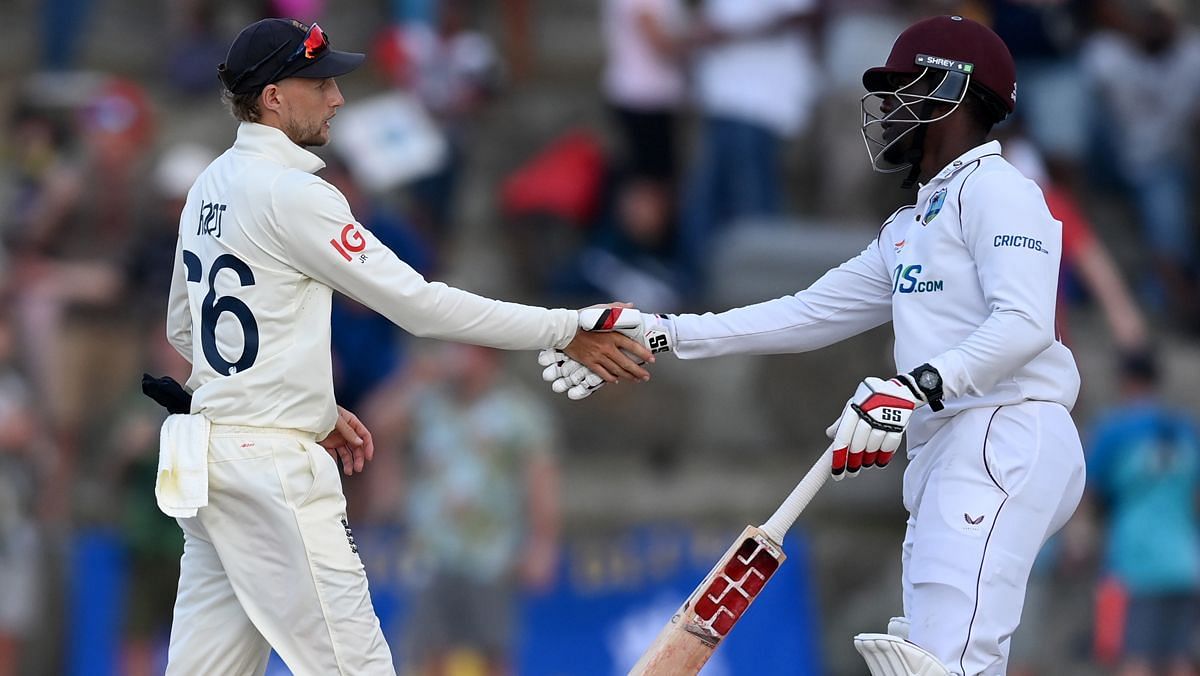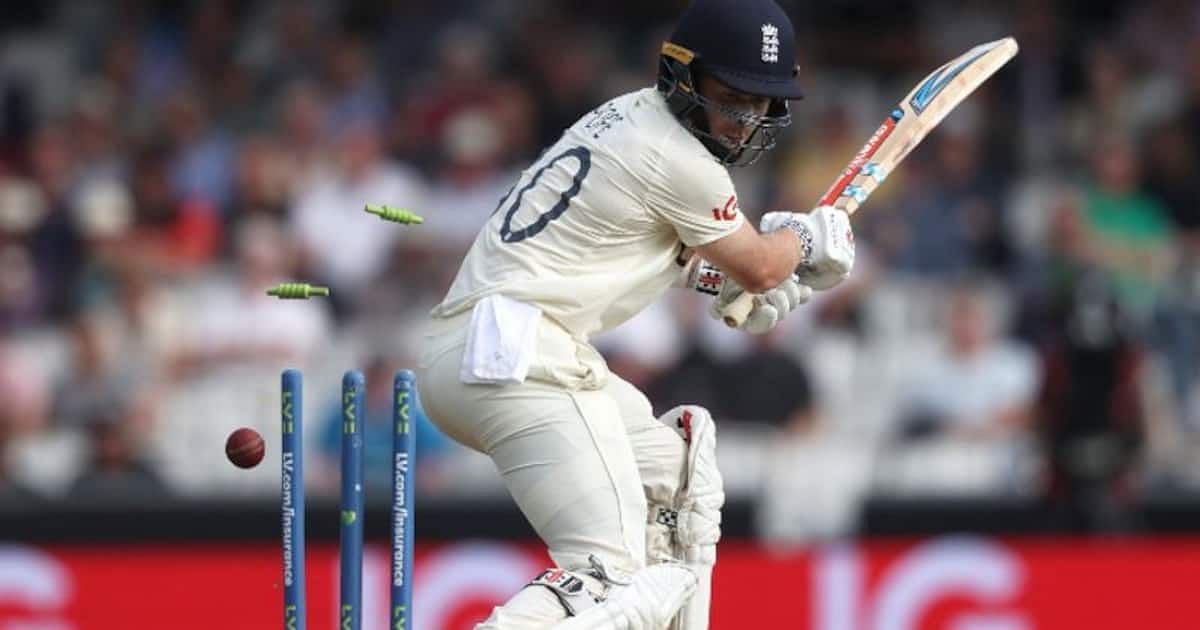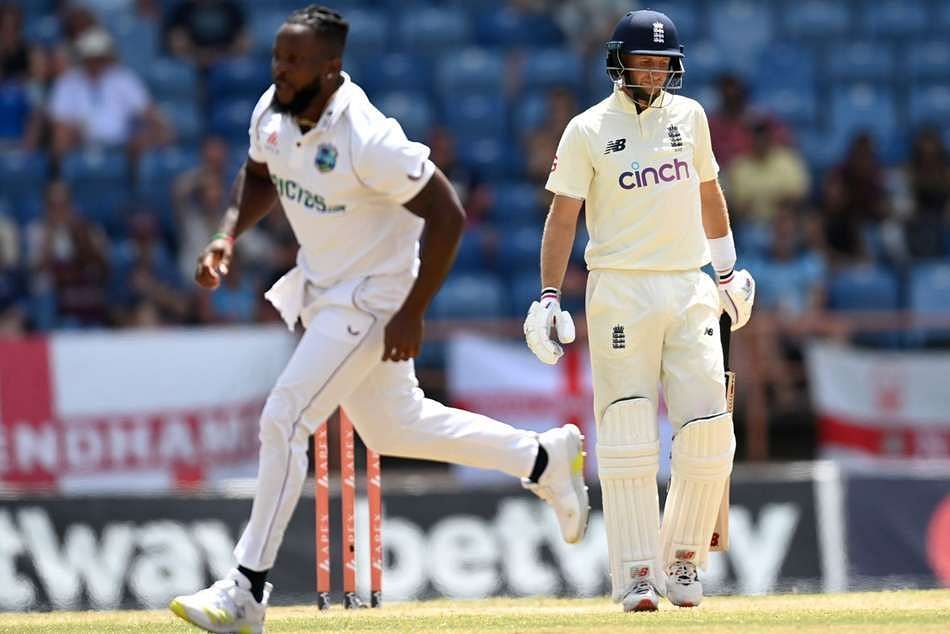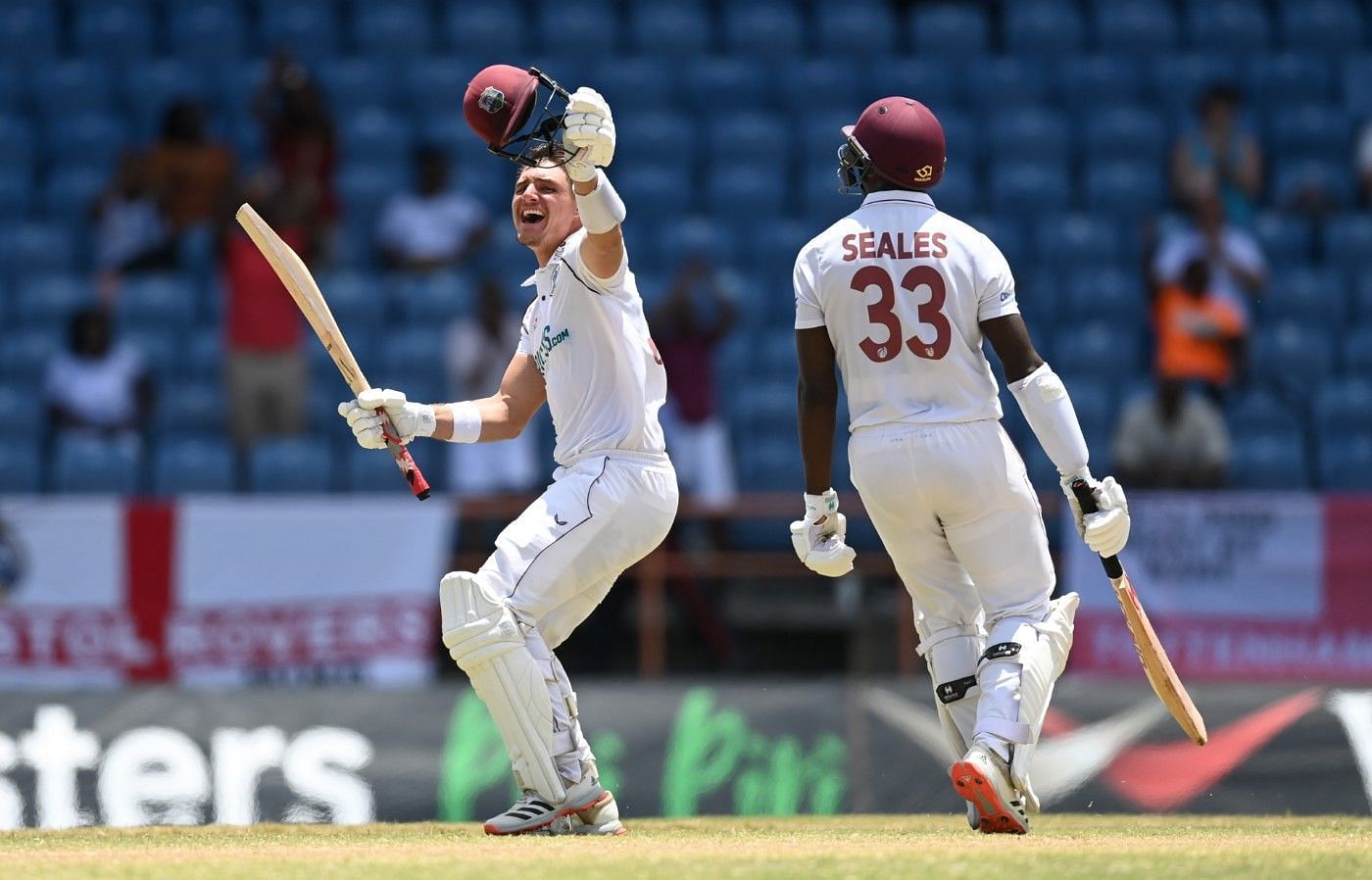
WI vs ENG 2022 review: England's red ball reset fails to ignite hope

The tale could not have been more different for the two sides when West Indies' skipper Kraigg Brathwaite braced for a couple and completed a 10-wicket win over a hapless England side. While one skipper held up his arms after notching a famous series victory, his counterpart simply gazed at the ground in what could possibly turn out to be his last outing as captain. After two drawn matches, England suffered their fifth consecutive Test series loss, equalling the worst-ever losing streak in their long Test history (excluding one-off Test matches).
Inconsistent batting with flashes of brilliance
Saying that England's batting department was in complete disarray at the start of the series would perhaps be an under-statement. Since 2019, there have been 15 instances when they have been dismissed for under 150. In the recently concluded Ashes series, their batting failed to muster 300 even once in 10 innings. Hence, they arrived in the Caribbean with a lot of mental baggage and few expectations.
In the Test series, however, there were some improvements showcased by the batting group. In the first innings of the first Test in Antigua, England went into early trouble at 48/4, and looking at their past performances with the bat, not much was expected. However, Jonny Bairstow carried on his form from the Ashes and hit 140 to take his side to 311, a total which allowed them to dictate terms in the match.

In the first innings of the second Test at Barbados, centuries from Joe Root and Ben Stokes allowed their side to score 507/9 declared, their highest score since their win in Chennai 13 months ago.
Moreover, England displayed intent in the second innings of both Test matches while setting up a total for the fourth innings. England's number three, Dan Lawrence, was the chief aggressor, who hit 91 in the process and was ably supported by handy knocks from Zak Crawley (who also hit 121 in the second innings of the first Test, becoming the first English opener to hit a century after 21 Test innings), wicket-keeper Ben Foakes and, of course, Joe Root.
At the end of the series, Joe Root also highlighted the progress of the batting order, saying as quoted:
"Throughout this series we've played some really good cricket, and shown what we're capable of as a group," Root said. "We've grown over first two games as a batting group, we've shown big strides in that department."
Despite the progress made in the batting group, there were the usual inconsistencies in the batting, which England could not eliminate completely.
Durham opener Alex Lees got a chance to open for the entire series after replacing Haseeb Hameed. However, he failed to impress after scoring just 126 runs across six innings at an average of 21. Wicket-keeper Ben Foakes also failed to stamp his authority after failing to convert his starts and scoring just 96 runs.
Except for Joe Root, none of the batters were able to score fifty-plus more than once in the series. In the last Test, on a spicy wicket, England's batting collapsed yet again after Root was dismissed early in both innings.
In the first innings of the third Test at Grenada, England were struggling at 114/9 before Saqib Mahmood and Jack Leach took their team to 204. There was no such recovery in the second innings, however, as they were dismissed for 120, with medium-pacer Kyle Mayers destroying the batting with a fiery fifer. Other Caribbean pacers, Kemar Roach and Jayden Seales, were unrelentless with their pace as well, completing the series with 11 wickets apiece and Alzarri Joseph one wicket behind.

After suffering batting collapses in both innings, England's batting coach Marcus Trescothick defended their batting, saying:
"We've had one bad day today and over the course of the series this is the first bad day we've had. Day one in Antigua we had a challenging day (48/4), but fought back really well. Barbados we were really strong and controlled most of the game and today it's gone wrong".
While England did display some fight and resolve in the batting department, most of it was displayed on flat pitches in Antigua and Barbados. However, when the batting group was challenged with unrelenting pace on a spicy wicket in Grenada, they failed to hold the fort, indicating that the batting had yet to learn from past mistakes.
Bowling lineup fails to shine
Honestly, England have just four world-class players in their Test lineup and two of them were left at home when the squad was selected for the series. Without James Anderson and Stuart Broad, this series was going to be a huge examination for the bowling lineup to impress. The ECB and the selectors felt that for the red-ball reset to be successful, they had to start by replacing the two main pace-stalwarts with fresher legs. But it was anything but successful.
The England team management received a big blow when their third-best bowler, Ollie Robinson, was ruled out of the series owing to an injury he sustained in the practice games. It was then accompanied by another big blow when Mark Wood suffered an elbow injury following the end of the first Test and was subsequently ruled out. This meant all the bowlers in the squad would be getting a chance somewhere in the series to manage the workload.
This also meant that Chris Woakes had to take up a leadership role in the young bowling lineup despite being under pressure to perform himself. For Woakes, it has been a curious case where his bowling average has been around 21 in home conditions, giving great balance to his team in terms of his batting abilities too. But whenever he has traveled overseas, his bowling average has risen to 50. This series was no different.
Opening the bowling, Woakes could not penetrate the batting in his opening spell as the West Indies notched up fifty-plus opening stands thrice in the series. Woakes also finished the series with a combined opening spell reading 22-6-81-0. He eventually finished the series with just five wickets to his name. The unavailability of Mark Wood meant that Craig Overton, Matthew Fisher and Saqib Mahmood got chances to bowl, with only Mahmood impressing after taking six wickets in two Tests.
Ben Stokes showed some improvement in his bowling form after the Ashes, becoming the third seamer for his side, and took seven wickets while also being economical in his long spells. However, the most impressive bowler for England was Jack Leach, who took 11 wickets and looked dangerous in the final innings of the first two Tests.
However, the bowling attack struggled to deliver the knockout punch to at various junctures, just like at Edgbaston, Lord's or at the Oval last year. In the third Test at Grenada, in reply to England's 204, West Indies were reduced to 128/7 before a maiden century by Joshua Da Silva took West Indies to 297, shutting the door on England completely. Even in the first Test, England reduced West Indies to 67/4 in the final innings but failed to penetrate further as the match ended in a draw.

At the end of the series, the English attack stood exhausted on the ground, having bowled 601.5 overs for 39 wickets.
England's leadership fails to inspire
Paul Collingwood was appointed as the temporary coach before the start of the series after Chris Silverwood left following the Ashes thrashing. Although he has the desire to take up the mantle of full-time coach, the series might just get him the boot. The punishment might not be too severe for the batting coach, however, after the side did show some progress in correcting their mistakes while batting. But the failure in the third Test across both innings will raise some doubts about his role too in the dressing room.
However, it is captain Joe Root who will come under immense scrutiny. Joe Root was the highest scorer in the series. He has always shown an appetite for scoring runs in difficult conditions and his name is already counted amongst the greats of English cricket. After having a tremendous 2021 followed by a small blip in the Ashes, where he failed to score a century despite getting the fifties, he was back to work as he scored two hundreds in the first two Tests. At the moment, Joe Root, the batter, is cementing his legacy as a modern-day legend.
His captaincy, on the other hand, has been the polar opposite. In the last 17 Tests, England have managed to win just one Test match under Joe Root with a win-loss ratio of 0.363. The numbers are just horrible. As a world-class batter, he has proven himself to be a terrible tactician and frustratingly timid when it comes to making decisions at crucial junctures.
In the second innings of the second Test, England were blamed for batting too long. While the pitch was indeed 'lifeless', Root did his team no favors by adopting a safety-first approach and giving his team only a few overs to force the result. On a slow pitch, it was evident that West Indies would not go for the target, yet Root declared with a lead of 282 with less than two sessions remaining. West Indies were five down at the end.
While Joe Root is undoubtedly passionate about his team, just passion cannot make a captain great. England's leading newspaper, The Guardian, highlighted how Joe Root was being affected by his own captaincy.
"Joe Root, world-class batsman, has one great misfortune: he has to play under Joe Root, third-class captain."
The main dilemma for the selectors has been that there is nobody to replace him as captain, which has allowed Root to go on for an extended period of captaincy without getting results. But with the Poms still on a sinking ship, the ECB and the selectors will have to come to a resolution.

Ben Stokes is the obvious choice for Test captaincy duties. An all-hearted cricketer, he has displayed a spark while captaining. During Pakistan's visit to England last year, Stokes led a group of rookies to a series whitewash over the full-strength Pakistan side in the ODI series. However, with Stokes battling a mental breakdown last year, he made it clear that he would not be available for captaincy duty.
Another option is to rope in the very man who led the reset in the limited overs' setup for the England side. Eoin Morgan has proven himself to be a great tactician and is one of the best batters on the English circuit. With the batting lineup still in murky waters, Morgan can provide some solidity in the batting, while his achievements as captain need no explanation.
A Test side is defined by the way they bounce back from a crisis. New Zealand bounced back from mediocrity to become the inaugural Test champions. Australia bounced back from the sandpaper-saga to win a historic series in Pakistan. India bounced back from 36-all out to win the series Down Under. England definitely have the talent to bounce back. But do they have the courage to do so? Only time will tell.